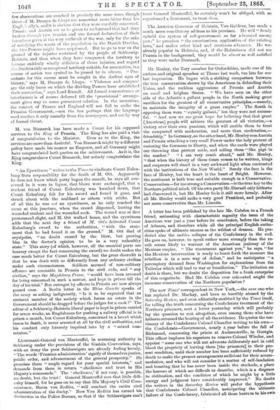"An Eyewitness" writes to the Times to vindicate Count Eulen-
burg from responsibility for the death of M. Ott. Apparently he does not know which party began the assault, he says all con- cerned in it were in liquor, that blows were exchanged, that a student friend of Count Eulenburg was knocked down, that Count Eulenburg felt for his sword and found it gone, and struck about with the scabbard as others with sticks. But of all this he was not an eyewitness, as he only reached the scene at this juncture, when the crowd dispersed, leaving the wounded student and the wounded cook. The wound was at first pronounced slight, and M. Ott walked home, and the eyewitness adds that the next day a friend of M. Ott's delivered Count Eulenburg's sword to the authorities, "with the state- ment that he had found it on the ground." M. Ott died of erysipelas, "no doubt caused by the blow, but proving him in the doctor's opinion to be in a very unhealthy state." This story (of which, however, all the essential parts are hearsay except the fact concerning the sword) no doubt makes the case much better for Count Eulenburg, but the great discredit is that he was dealt with so differently from any ordinary civilian under such circumstances. Soldiers accused of non-military offences are amenable in Prussia to the civil code, and "any civilian," says the Magdeburg Presse, "would have been arrested for being concerned in such a matter, and kept in prison till the day of his trial." But outrages by officers in Prussia are now always pawed over. A Berlin letter in the Rhine Gazette speaks of the army as asking indignantly, "Is it to be expected that an eminent member of the society which forms an estate in the Government should be dragged before the judges for a cook ?" The editor of a Schleswig-Holstein liberal paper is kept in prison untried for seven weeks, an Englishman for pushing a railway official is in prison a month, but Count Eulenburg, concerned in a brawl which issues in death, is never arrested at all by the civil authorities, and his conduct only leisurely inquired into by a "mixed coin- mission."






























 Previous page
Previous page